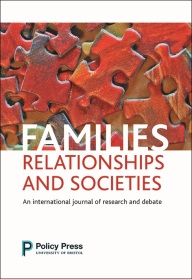
Mary Holmes
Mary Holmes, Co-Editor of Families, Relationships and Societies, discusses the new special issue of the journal which is now available on Ingenta.
It may seem obvious to most of us that we rely on other people for care and support, but how has that changed given the fragmenting tendencies of contemporary life? In the latest issue of Families, Relationships and Societies we look at some of the different ways in which people care and are cared for from Finland, to Sweden, the UK, to the Phillipines. Whether it is caring for children, grandchildren, teenagers, or the elderly, care calls upon our bonds with other human beings.
Whatever the kind of bonds or location, social forms of care include state provision and welfare services, as well as informal care arrangements. People use family, friends and other connections to get the support they need. It is not always easy and may require negotiation and involve conflict. Some informal arrangements may be ad hoc and fragile, but some may contribute to community building and be good alternatives to more institutionalised care provision.
“Childhood, sickness, frailty and old age mean receiving care at times of vulnerability, but even in these cases the cared for might offer some support to others”
A lot of care is mutual. Childhood, sickness, frailty and old age mean receiving care at times of vulnerability, but even in these cases the cared for might offer some support to others – be it financial or emotional. In everyday terms, we give and take care. A friend makes us dinner when we are busy, we look after their children when they have a meeting. A colleague offers to help with our marking and we take a class for them to return the favour. Older children may take a turn to cook, or listen to their parent’s small woes. Caring changes. Parents care for children together and then perhaps alone; help from grandparents disappears as they die; supportive friends move to another town or country. Alongside these ‘private’ forms of caring are changing public provisions and policies that impact on how people care.
The impact of the rolling back of the welfare state in many countries shifts care responsibilities back on to the private sphere. For example, we see in one article how austerity has made lone mothers in Finland more reliant on informal support networks. In another, Swedish parents have to deal with pressures to control their teenagers’ alcohol consumption. These are changes in what care means and in ideas about who should care for whom and how.
“The articles reveal generational and cultural differences in expectations around care.”
What care means in different kinds of relationships also changes, and the articles look at parents and teenagers, children and child carers in institutions, social workers and clients, parents and parent-in-law, grandparents, children and grandchildren within multigenerational families. In one instance, we see Filipino daughters-in-law making efforts to create affinity with their mothers-in-law to help them balance a sense of autonomy with caring according to cultural norms around obligation to parents. The articles reveal generational and cultural differences in expectations around care. Women also still have to make sense of having the greater part of the burdens and satisfactions of care. Yet people work at caring for each other.
Different contexts of care affect how it is given and received. For example, one author argues that institutionalised care can give children a different sense of time to ‘private’ forms of care. Meanwhile, in social work practice, care becomes difficult if always concentrating on risk prevention, especially within child protection. The articles do not glorify informal or private care as innately superior, but point out the difficulties of caring in the current climate. The social pressures on ‘private’ forms of care can be acute as people try to look after each other around the demands of work, changing demographics and shifting social norms. Fear-oriented assessments of risk, emphasis on responsibility and self-reliance and the withdrawal of various public services have different impacts according to gender, age, disability, class and race/ethnicity. Limited availability and problems within publicly provided care forces people to find support within often already overstretched networks or communities.
Self-reliance is a fantasy, albeit a powerful one, and it is imperative to know how families, friends and public bodies navigate around it to provide support. Here we see them using a range of ways to maintain relationships of support at a time when vulnerability and care are often degraded. Care remains a social achievement.

Read the special issue “Social forms of care: changing relationships of support”.
For news about all the latest Families, Relationships and Societies research sign up to our mailing lists and follow the Journal on Twitter.



